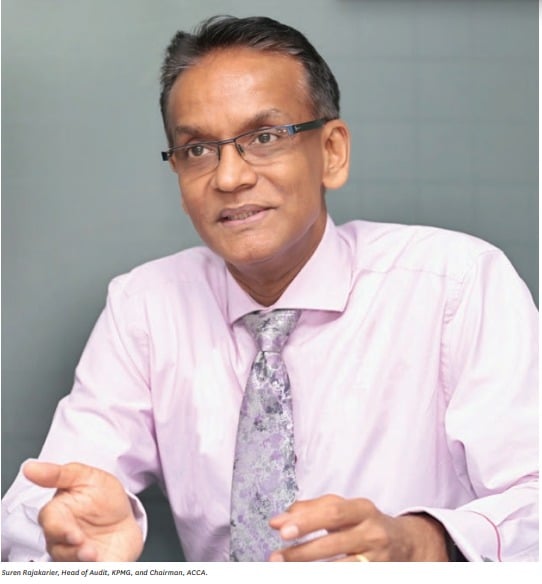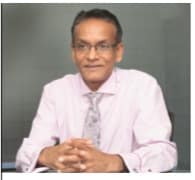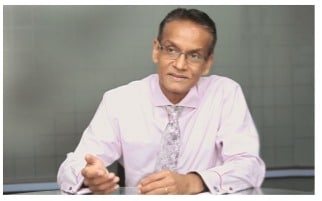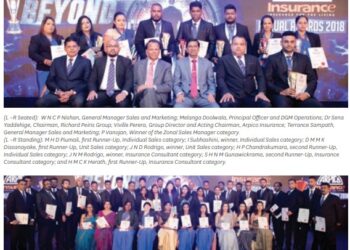
Producing qualified accountants trained for the global market is one of the top objectives of the ACCA, according to Suren Rajakarier, Head of Audit, KPMG, and Chairman, ACCA. Despite the rise in numbers, Sri Lanka is faced with a shortage, led by the trend to respond to the demand abroad. Outlining the changing role of the accountant from keeping books to becoming savvy in a digital age, Suren Rajakarier spoke about the challenges of compliance, governance, and ethics. He explained further how KPMG, as one of the large global firms, has maintained the standards by adhering to best practices in the profession
What is the role of the ACCA in Sri Lanka?
ACCA has been in existence globally for more than 115 years and in Sri Lanka for a long time, though the formal office was set up in 2002. The mandate of the ACCA is to increase the influence of the accounting profession on a global level. We manage a global operation in Sri Lanka through the local office. Our objective is to increase the student population, convert them to qualified members termed as affiliates, and thereafter enable them to become members and join a global workforce, demonstrating global skills and ethical behaviour. We have about 219,000 members and more than 527,000 students globally. The numbers in Sri Lanka have been growing in the recent past because of its popularity. The qualification is a global passport for many students, which is good for the individual, but unfortunately we also lose many of them to the global market. Our globally recognized professional qualification facilitates people to seek employment overseas.
What are the professional skills that are required by accountants, especially in Sri Lanka in the global context?There are many skills, which are required by any professional. The ACCA has identified seven essential professional competencies, which are important for students and members following a research done globally. The most vital aspect among them is the importance of being digitally savvy to keep up with emerging tech.
Everything in business has currently been disrupted by digitalization, whether it is banking, insurance, or healthcare. Therefore, digital quotient or digital experience is essential, and so are creativity and vision, which have always been a skill requirement for the professional. Emotional intelligence, the ability to understand another person’s viewpoint and act accordingly, as well as using experience to influence others have been identified as important areas. I believe intelligence is essential not only for an accountant but for any professional. The emphasis is to be more business savvy, have commercial awareness, and be able to contribute to the business, rather than being a bean counter in a corner.
I Believe Intelligence Is Essential Not Only For An Accountant But For Any Professional. The Emphasis Is To Be More Business Savvy, Have Commercial Awareness, And Be Able To Contribute To The Business, Rather Than Being A Bean Counter In A Corner.
There is a certain perception about accountants or the accounting field. How can we bridge that gap and make the profession more appealing or customer-friendly?
There are challenges of being an accountant. Accounting sometimes is not appealing or does not have the happy quotient for millennials. One of the problems is being ethical and following all governance standards. Eventually, what happens in a corporate is, that the accountant acts like the policeman for governance and ethical standards. Finance is also based on controls and budgets. A large number of other professionals in organizations do not like controls and budgets. A person in marketing would like to spend so that the business grows. Likewise, the production person will want to expand irrespective of whether there is a profit or not. The accountant has to be the conscience of the company, control and make sure that adequate funds are available for salaries and profits for the shareholders. These requirements make the accountant become very stereotypical or controlconscious at the beginning. Our training is based on complying with rules and standards. Many people think that accounting is boring or that accountants do things only by the book and that an accountant has to only engage in aspects related to accounting. Today most accountants in Sri Lanka are on company boards and become business partners as opposed to working only as accountants. Becoming a business partner means contributing to strategy, being a sounding board for the board, and assisting the CEO in making the right decisions. The last decade has seen the emergence of professionals as a result of computer science and advancements in technology. Airbnb is disrupting the hotel industry, for instance. With Apple and Google, anyone can develop an app and become a millionaire in a few years. Apps are running most businesses, including taxi services, to healthcare and insurance. People are opting for other professions since being exposed to more options in the last ten to 15 years. Fundamentally, accountants will be required for all these professions and businesses. Without accounting, they will not meet the profit objectives or will not be able to develop a sustainable business model. Therefore, every individual coming into this profession needs to have a positive view of it and consider it as an interesting profession to be in, because you interact with everyone and have the opportunity to make an impact across many spheres.
We have seen globally and in Sri Lanka, companies that were deemed strong and stable collapsing. In such instances, what is the role of the accountants/audit firms?Are they performing their responsibility?
A business is not managed by an accountant alone; there are many people involved. We need to consider the extent of the influence the CFO or the accountant has and whether the CEO accepts the advice provided by them. In many corporates, the CEO acts independently of any advice given. There are examples of banks where the CEOs had failed to listen to the management committee and the accountant, and took decisions for the sake of short-term profits. But when the market turned upside down, losses started hitting their P&L. Even with the best accountant, if all the depositors ask for their money tomorrow, even the best bank in the country will collapse. It is considered a market risk when a conscious investment decision goes wrong. The decision, however, should not be a result of fraud, mismanagement, or misinformation. In many of the major collapses, the information had been hidden, or they had not taken the right advice. Auditors generally perform their review towards the end of the year; it can be an interim or a year-end audit. Auditors rely on the information given to them. The audit is performed within two months after all the transactions have been completed during a whole year and is done according to set standards and guidance. However, the guidance does not say that the auditor will investigate and find all fraudulent transactions.
The Problem Is Not About Having Rules; It Is About Monitoring And Implementing Them… There Are Adequate Laws, The Courts, And The Police, But No One Wants To Follow The Rules. It Again Goes Back To Our Foundation In Terms Of Governance And Ethics.
What would be the next step? Should this be addressed through regulations?
There are many regulations in place. Some countries are talking about deregulating the listed markets. The problem is not about having rules; it is about monitoring and implementing them. A simple example is our traffic laws. You and I use the roads, but no one follows the rules. There are adequate laws, the courts, and the Police, but no one wants to follow the rules. It again goes back to our foundation in terms of governance and ethics. I believe it might help if training at the student as well as professional level focuses on ethics and governance, and especially inculcates these over a long period in students. But before that, our schools have been teaching about morality and ethical behavior from pre-school days. What has happened in Sri Lanka is that the ecosystem or the environment has changed where people do not respect the rule of law. As a result, they do not have confidence in the teachings at schools or the professions. The attitude then is that anything is acceptable, which leads to individuals starting with small misappropriations, which they succeed to pull off. They also see role models who are thriving despite living by fraudulent means. They would then question why they cannot engage in relatively smaller frauds since their role models are involved in bigger scams. That is how it begins in private and public entities. Employees at the bottom start small-scale frauds, which become bigger. How are we going to stop it? Laws won’t stop it, because then you would have to have two policemen behind every individual in the country. Even the policemen can probably be paid off to carry on the fraud. Ultimately, ethics, governance, ecosystem, and respect for law have to be in place. The various sections in the Government have to work, such as law enforcement, legislature, and the executive. People in these institutions have to be serious about tackling the situation. In the corporate sector, every monitoring authority, the Registrar, SEC, CSE, the Monitoring Board, the Insurance Board, and the Central Bank, have to implement the law equally for everyone. Only then will everyone start respecting the law and know that any wrongdoing will have consequences. Currently, the consequences of wrongdoing are probably for the poor or the powerless, not for the rich and the powerful. Why would anyone respect the law? There is a saying “When in Rome, do as the Romans do.” I would say put Sri Lanka wherever you want on that spectrum of compliance.
What are your thoughts on mandatory auditor rotation?
In terms of perception, mandatory audit rotation does not automatically deliver quality. The independence of the auditor should be considered before talking about compulsory auditor rotation as some companies probably use this for the wrong reason. It is understandable if a company implements mandatory auditor rotation if there is proper governance in place in the company. But if there are adequate regulations in place, why can’t they ensure that the auditor is independent? If an auditor is not independent, it’s probably because the governance structure of the company is not in place. The primary responsibility of the board and the audit committee is that members should ensure that the auditor is independent. An independent auditor can provide a quality service

If a company is rotating them, it means that the company is unable to confirm the independence of its auditor. If I am on the board and if I am the chairman of the audit committee, then I should know first, whether my auditor will be independent and second whether the auditor is able to provide a quality service. In certain corporates, they use it for the advantage of replacing the auditor or reducing the fee. But what people do not understand is that the more you keep reducing the price, it will impact the quality of the audit. Primarily the audit committee has to do its work to ensure that the auditor is independent, capable of providing a quality service, and to ensure that the auditor is paid a reasonable fee. Their job is not to keep reducing the audit fee, but to ensure that a quality service is provided for a reasonable price.
Can you speak on the role of KPMG in Sri Lanka?
KPMG per se is traditionally in the audit, accounting, advisory, and tax services. We are one of the big four entities globally. Our focus is to make sure we are an ethical choice for our corporates and also to be the best accounting firm in the world, rather than being the largest. We focus on building trust through quality services. We focus on trust because, following the global financial crisis in 2008, people lost faith or confidence in audit firms. People’s constant comment was – “you audited, and the company went bust in two months.” Building trust is a lifetime activity, but you can lose it in a few minutes. Once we lose confidence, building it again is going to be a long process. We are continually building trust through our operations, systems, and the methods we use and the choices we make. Even in the case of client acceptance, there are stringent rules as to whom we can work with and whom we should not work with. There are strict rules to be followed once we take on an engagement. The rules are evolving all the time. Our focus has been on trust and quality. There are some legacy issues, which we are sorting out in several countries. But, we have successfully built our reputation in all the countries that we are present. I am proud to say that in Sri Lanka, we have been continuously selected by our clients as the most respected firm. We are pleased to work with all our compliant clients. We ensure that they comply because we do not consider challenging for client compliance as causing issues. It’s about safeguarding the boards and the shareholders. Our purpose is to be the clear choice for professional services in the country and at a global level.
On what basis was KPMG awarded Platinum status?
We are the ACCA’s Platinum status recognized organization for trainee development and professional development. We were the first to be recognized in Sri Lanka way back in 2007. Since then, we have retained that status. It is an evaluation by ACCA based on global standards, which is conducted once in three years. They have continuously endorsed our firm as a professional development and trainee development entity with Platinum status. The ACCA also identified other aspects; such as the facilities provided for developing trainees and professionals, and our ethical standards. They look at whether we assist them in many aspects of professional development. We have continuously met ACCA’s global standards for Platinum status.
What can we do about migrating overseas experienced and qualified Sri Lankan professionals?
We have implemented many processes as a firm to address this issue. However, intervention is required from the level of Government, then the regulators, professionals, professional associations and companies, eventually coming down to the individual entities and the people. It’s about giving confidence to people and also making it a great place to work. There are several aspects to it. People belonging to the baby boomer generation and the X generation remain and continue to support the country and see whether there will be change or are hopeful. But it has been a rough road in terms of change. Now and then, we have hope, and then that hope is destroyed. It has been a roller-coaster. We are never on an upward trend; instead, we are on a cycle. That has negatively impacted the young people, especially the millennials or Gen Z. Millennials want to progress, and they want to do interesting jobs. They do not want to be in one company for the rest of their lives. They move overseas once they find that companies in the country do not fulfill their expectations. They gather information online and understand that global corporates have changed their methods of working, providing greater flexibility. But what is more worrying is economic prosperity. There are three major concerns; the economy, education, and healthcare, and all three have been continuously on the decline. The standards of education has been shifting all the time – going up and down. The Sri Lankan universities have a limited number of places. We also have the option of private universities in the country, which are not so highly ranked.
Another option is to adopt the approach that other countries such as Qatar, Dubai and Malaysia have done by opening education centers. They have attracted international students as well as provided a means to their citizens to study in the country at globally recognized universities. We too had that opportunity many years ago, when a few universities wanted to establish here, but then we destroyed those opportunities. It is the same situation with healthcare. We try to build globally recognized brands and bring global companies to Sri Lanka, chances which have been wrecked again.
Our medical professionals are earning much more overseas. Currently, there are no provisions for health tourism. There may be a few quality healthcare service providers, which are the exceptions.
Our currency rate is a good indicator of the state of our economy. Our GDP is not that bad, but we can do much better. Rather than focusing only on tea and other commodities and tourism, we should look for more revenue-generating operations. We should improve manufacturing facilities and services, provide incentives, or influence people to start businesses in the country, make our tax system more user-friendly
Our Focus Is To Make Sure We Are An Ethical Choice For Our Corporates And Also To Be The Best Accounting Firm In The World, Rather Than Being The Largest.

Our tax regime has become more flexible, but it takes a long time for laws to be implemented. Inconsistent policies are driving many foreign companies away. They want to invest in Sri Lanka, but the study the environment and leave when they learn about Government policies concerning businesses. Hence, we are unable to attract the top companies in the world. At one point, there was a strategy to get the top 500 or at least the recognized businesses into Sri Lanka, which will have a knock-on effect on others. When other companies find that these leading brands are in Sri Lanka, they will be confident to follow. But when we continue to discourage global investors stating that we will manage on our own, there is a substantial negative impact. It is the same with hotels as well. We have excellent Sri Lankan hotel chains, but if there is not a single global brand, foreigners will think twice about coming here. When we have a few international brands in Sri Lanka, our hotels too will flourish. Both properties will receive star ratings, thereby gaining the confidence of visitors. Therefore, attracting global brands into the country will be an achievement for us.
Our Tax Regime Has Become More Flexible, But It Takes A Long Time For Laws To Be Implemented.
At the same time, some of our business people compare Sri Lanka to India, Singapore, or some other big country. India and China can survive on their own because they have large populations. We are a small country. Singapore is a small country as well, but they had the strategies and political will to develop, and they succeeded. Most importantly, Singapore had the discipline. We can compare ourselves to countries that have a similar population. Singapore, Australia, and New Zealand they all have structured processes, Government, and the people are disciplined. Therefore, these countries have become developed nations. Sri Lanka plans for development, but we do not respect controls and structures, nor are we disciplined. When investors come to Sri Lanka, they think of it as a beautiful country and investments don’t flow in. Therefore, the impact is not there. There is much to be done before we talk about retaining professionals in Sri Lanka. If they feel that there is a future for them and their families, then they will stay in Sri Lanka.
There are many accounting bodies in Sri Lanka. How would a person differentiate?
The CA is the apex body in Sri Lanka, and there are a few other professional organizations. The ACCA is globally recognized, and it is also the only body that is significantly growing on a global basis. The demand is for ACCA accountants. KPMG is the largest employer of ACCA students in Sri Lanka. That is one of the reasons that we lose a large number on overseas mobility. The demand for ACCA is high because the knowledge of English and communication skills of our accountants are excellent. Our syllabus makes the accountant digitally savvy. We have the most digitally progressive qualification currently in the world. The case study method and the syllabus have evolved to keep up with the current trends in the market. Our head office in the UK keeps changing the curriculum continuously to make sure that our students are trained based on current demand. The publications and thought leadership in the ACCA website is the most significant number compared to any professional organization. Moreover, ACCA UK was voted as the best accounting body for producing thought leadership. They have been building on the required professional skills for people on ethics and governance in a digital environment, which are specific topics and rolling it out in all the countries. The results can be seen by our growth and demand for our professionals.
Most of the other accounting bodies are becoming slightly politicized. How do you maintain professionalism?
The ACCA’s strategy has been to produce more informed quality thought leadership to make sure its members are always kept up-to-date and in demand, without relaxing the intake requirement. The moment you start relaxing the intake requirements, the quality of the people qualifying will also decline. The ACCA is the only accounting body which is growing, and 527,000 is a massive growth, which is a result of people recognizing ACCA as a leader among these bodies. This is achieved by governing the organization in a professional manner, taking into account the needs of all our stakeholders. Our offices in every country have been asked to collaborate locally to improve the accountancy profession. Locally we work with all universities to give students a pathway to join the ACCA. We also collaborate with Government entities to bring their students into the profession. We collaborate with corporates to urge them to influence their employees to study ACCA and become employable because our ultimate objective is to increase the number of accountants.
The ACCA’s Strategy Has Been To Produce More Informed Quality Thought Leadership To Make Sure Its Members Are Always Kept Up-To-Date And In Demand, Without Relaxing The Intake Requirement.
Our country does not rank high on the number of accountants to GDP, whereas the number of accountants is significant in countries with a higher GDP. These findings are based on a global study. If we do a study on GDP to accountants in Sri Lanka, the results will show that we need much more accountants to grow. So we focus on our objectives and not on other distractions.
In Sri Lanka, auditors are getting into the boards of corporates. How do you respond to such a situation?
There is always a perceived conflict, which is what KPMG has been talking about, not recently but way back since mid-2000. Globally, KPMG attempts to influence every country to stay away from getting on to boards. At some point in time, even unconsciously, there will be some amount of non-independent decision making. We want to avoid clients or companies or individuals accusing the audit partner of using the information from that particular client in their business. For example, if I am on the board of a bank, there will be a great deal of discussion on customers, credits, and bad debts. Some of that information can be used in my business. Therefore, we try to avoid such a scenario, so that such a perception never even arises. It is a different story if a company wants advice, as that is our business. Our business is in audit, tax, and advisory services and not to act as a board director. There is a rule for cooling off period for partners to join boards after retirement. The cooling off period is implemented to make sure that none of the decisions you made in the past have an influence in the future. Decisions can be outdated in one or two years. There are provisions for accountants/audit partners to join boards once that period has passed. The other side of the coin is a lack of independent directors on corporate boards, which is a result of shortage of skills. It is also spoken about at the Directors’ Institutes. There are inadequate independent directors on boards, and a lack of competent accounting professionals to get on boards and to chair audit committees. After retirement, these professionals can join corporate boards. But there are no provisions to allow young accountants to join boards even if corporates want them to Companies want to have partners from audit firms to sit on their audit committees because they can add value. However, you still cannot avoid the perception among other stakeholders that you are possibly using them for unethical or other reasons. Therefore, it is best to avoid that perception, and that is the reason we do not accept board positions. We do not encourage anyone else to either.
What is your opinion of the future of the profession in Sri Lanka?
Many people speak about the profession being challenged by digitalization, and that robots and computers will replace us. I heard this in 2000. There was a conference in 1999, about the beginning of 2000 and the new millennium. They discussed that accountants would no longer be required because Microsoft, Apple and others would replace them. Our numbers in ACCA more than doubled in that same period. We produced more than 120,000 accountants in that same period where we were supposed to be extinct. This is because corporates see the value accountants bring to their operations. Some of the standardized manual tasks may get replaced by computerization or digitalization. But many other areas such as decision making, judgment over what to do and what not to do, implementing choices in accounting standards that an accountant has to do, cannot be replaced by computers or artificial intelligence. In the future, it may change, but not yet. The numbers have been multiplying and currently even as at today, accounting remains one of the most favored professions on a global basis. Our student numbers are 527,000, which is a testament to that. Accountants will not be done away with, but they will evolve into using computers and digitalization in a more effective way to produce better results for companies. At some stage, the results have to be monitored. The future has been excellent in terms of the numbers, and it is still attractive. Qualifying as an accountant is the fastest way to earn and to reach the middleincome level in Sri Lanka. Students spend four years studying for a university degree, and when they finally get the degree, there is the question of employability. On the other hand, an individual spends three years studying ACCA, and at the end of the course, they are employed and earn about 150,000 to 160,000 rupees a month, which is the starting salary,
There Is A Demand For Accountants In Sri Lanka And Globally. One Of ACCA’s Focus Has Been To Increase The Numbers Where Everyone Becomes Employable And Has A License As Soon As They Qualify To Be Employable, Digitally Savvy Individuals
It is the same with IT. Some people hit the jackpot through their intelligence, creativity, and innovativeness, where they create an app or have developed something and have moved to the high-income range. But if you look at the majority, on average, every accountant is employed. There is a shortage of skills currently for accountancy, which is driving the demand for our people for overseas jobs. If there were no demand for accountants overseas, our people would not be migrating, and the brain drain would have stopped. There is a demand for accountants in Sri Lanka and globally. One of ACCA’s focus has been to increase the numbers where everyone becomes employable and has a license as soon as they qualify to be employable, digitally savvy individuals.
Do the numbers reflect the quality of the accounting profession?
The value of accountants is very high even today. If these accountants are not good, there would not be a demand for them. Sri Lankan accountants were sought after in the 1970s in Africa, in the 1980s in the Middle East and in the 1990s and the 2000s, in Europe, Australia, and the rest of the region. Even today we are losing our recently qualified young accountants to Australia, New Zealand, Luxemburg, Ireland, and the UK continuously. That’s been a recent trend, and in the last 12 months, we have had more than 20 people who have migrated or on secondment to these countries from KPMG. These young accountants would not have jobs if they were not good. Generally, when one person is hired by a company which finds that person to be exceptional, then the next person is recruited. When the second person goes, then the company wants more accountants. That is how the numbers grow. About five to ten years ago, we had more than 25-30 people from our firm working in the Caribbean Islands. What happens is that once they earn money they migrate to Australia, UK, Canada, or the US. It is similar to a product. You buy a product or service for the second time only if it is good. The demand for Sri Lankan accountants is still on the rise. We do not produce enough as the number of accountants in the country is not enough for the number of business entities in the country. One of the main focus areas of the ACCA is also to increase the numbers.





